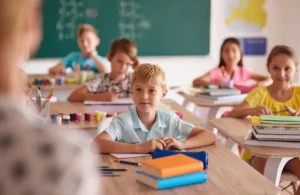The summer slide is a phenomenon that many children experience over the summer months. Most children lose 20-30% of what they learn from the school year during summer – leaving teachers (and parents) to reteach much of that content. Parents need to be aware of ways to prevent this, as it can affect their child’s academic performance in the coming school year.
What is the summer slide?
The summer slide, also known as summer learning loss, is a common phenomenon that has been around since the mid-90s. The concept is based on a comprehensive study that found some children lose significant knowledge in reading and math over the summer break. As a result, this setback would snowball in the subsequent school year, causing a learning gap.
Although learning loss affects all children, some demographics are more vulnerable than others. One study suggests that children in 3rd to 5th grade lose, on average, about 20% of their school-year gains in reading and about 27% in math during the summer break.
Younger children are more susceptible to falling behind because they’re still at a crucial development stage. The reading, math, and comprehension skills they learn at this age are susceptible to decay without practice.
Children with learning differences are also vulnerable to summer slide because they don’t have access to the instructional support they usually receive throughout the school year.
Some studies estimate that summer slide can place students as much as three months behind their peers when school resumes in the fall.
How to stop the summer slide?
As parents, it’s critical to keep children engaged during the school break and prevent the summer slide. Here are some ideas:
- Read aloud with your kids daily. Reading is an easy way to help them retain what they’ve learned during school and keep their reading and language skills sharp. It’s also an excellent way to add some family time.
- Listen to audiobooks. Listening to an audiobook requires the same cognitive skills as reading in print, and also supports the development of skills that children need to read including language comprehension and the ability to understand and retain information.
- Encourage them to write, read, and practice math in real-life. Look for activities that get their imagination going. This will help them develop creative thinking skills. Instead of writing essays, consider storytelling a fun way to practice reading and writing. Play real-life games like going to the grocery store or the bank to sharpen their math skills.
- Keep them engaged. Find something your child enjoys doing and find ways to make learning fun. If they like playing outside, take them to the zoo. If they enjoy reading books, go with them to the library.
- Plan play-dates. Summer slide it’s not just about academic skills – it also affects social and emotional skills. Make sure to plan play dates to focus on developing healthy social skills.
- Find a quiet space at home. When reading or engaging in activities like building LEGOS or solving puzzles, it’s crucial to have a space without distractions. Set up a learning environment for them around the house, preferably one they’ll continue using once the school year begins.
- Set healthy habits. Maintaining healthy learning habits is important before the school year starts. While children see summer as a time to relax, healthy learning habits such as reading or practicing math can help once the school year resumes.
It’s important to keep children engaged during the summer months
Sometimes, getting a specialized tutor before school starts can help close the learning gap, particularly in students who have learning differences. At The Learning Lab, our FLEX Program is designed to help prevent the summer slide and keep children engaged before the school’s fall session starts.






